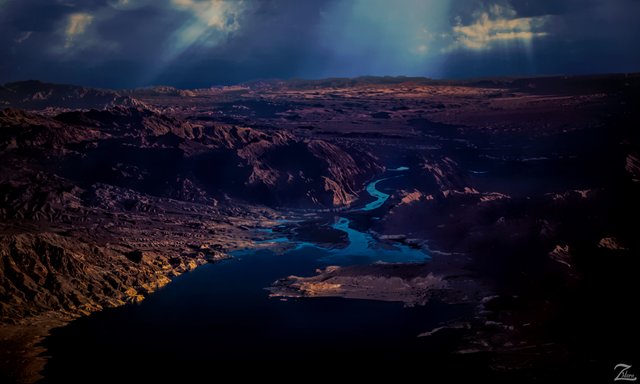Sunrays Streaming Down on Iceberg Canyon
As the Colorado River exits the Grand Canyon it passes through Iceberg Canyon into Lake Mead in the Gregg Basin. Following a great rainstorm I captured this image while flying northeast over the Gregg Basin on my way to land and camp out at Grand Canyon Gulch.
With sunlight streaming through skies darkened from the thick storm clouds nature paints a brilliant palette juxtaposing the rich copper reddish colors against the deep blue hues of the river as it passes Devils Cove and the Iceberg Reef through Iceberg Rapids and Sunfish Cove and around Sandy Point into Lake Mead.
In Spanish: Río Colorado, means "Colored River", with an implication of the natural reddish, muddy color the river used to have that caused by its natural sediment loads. After multiple dams were built to harness power and control seasonal flooding (still controversial after many decades) the upstream silt is now filtered out by the dams and is no longer seen as muddy or colored but instead has acquired a clear blue-greenish hue as seen here.
One of the principal rivers of the Southwestern United States and northern Mexico The 1,450-mile-long (2,330 km) Colorado River drains an expansive, arid watershed that encompasses parts of seven U.S. and two Mexican states. With its headwaters located high up in the central Rocky Mountains in the U.S., the river flows primarily southwest crossing the Colorado Plateau and into the Grand Canyon before reaching Lake Mead on the Arizona–Nevada border. Here it sharply turns south towards Mexico where it runs through the mostly dry Colorado River Delta at the tip of the Gulf of California between Baja, California and Sonora.
The first humans of the Colorado River basin were likely Paleo-Indians of the Clovis and Folsom cultures, who first arrived on the Colorado Plateau about 12,000 years ago. Beginning with small bands of nomadic hunter-gatherers, First Nations Tribal peoples inhabited the Colorado River basin beginning 8,000 years ago. Between 2,000 and 1,000 years ago, the river and its tributaries fostered large agricultural civilizations, – some of the most sophisticated indigenous cultures in North America – which eventually faded over time.
Another notable early group was the Fremont culture, whose peoples inhabited the Colorado Plateau from 2,000 to 700 years ago. The Fremont were likely the first peoples of the Colorado River basin to domesticate crops and construct masonry dwellings; they also left behind a large amount of rock art and petroglyphs, many of which have survived to the present day. It is worth noting that a great deal of controversy still exists over First Nationals Tribal water rights in the Colorado River basin which have been routinely largely ignored during the extensive water resources development carried out on the river and its tributaries. Construction of dams has often had negative impacts on First Nations peoples, such as the Chemehuevi; their riverside lands were flooded after the completion of Parker Dam in 1938.
Ten Native American tribes in the basin now hold or continue to claim water rights to the Colorado River. There are at least 5 First Nations names for the Colorado River -
- Maricopa: Xakxwet
- Mohave: 'Aha Kwahwat
- Havasupai: Ha Ŧay Gʼam and Sil Gsvgov
- Yavapai: ʼHakhwata
This is from "Where Eagles Fly - The American Wilderness Expedition" my personal project of exploration in the North American Wilderness.
I'm on a mission to raise awareness of our Iconic Natural Heritage Treasures of North America.
Please re-steemit if you like what you see and want to help spread the word!!
Yehaw!

amazing @skypilot Your post is very interesting and nice I like the post you have shared this, you are very creative in determining the object you will make asost, hopefully with this post you share this get the achievement as you have hoped, hopefully you always succeed and can make Again an interesting post
When humans first saw the Grand Canyon someone said this land wouldn't be good for anything... how wrong they were.
Amazing shots!!!
By the way great post you wrote there :)
incredible pictures @skypilot
You are so right about the juxtaposition, it is stark. Brilliant photo!
The feel i get from this is:
"Genesis, the waters being separated from the dry land."
or
"An impeding doom, the waters being evaporated from the earth."
Am i thinking too much? (⊙_☉)
Whew, it almost looks like another planet. Incredible shot and history recap!
I kayak all over lake mead, (I live in Vegas), I was wondering if there are some good runs for kayaking upriver from lake mead. Gregg Basin looks pretty awesome in the article's picture. Does anyone know of some good spot to kayak?
Amazing capture my friend thanks for the post, mother nature is sure a beauty i also followed and resteem